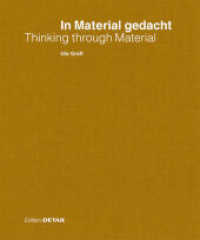基本説明
Provides a 3-part conceptual model in which the achievement of equity for all - regardless of race, gender, or ethnicity - is an ideal that is central to urban education.
Full Description
Many factors complicate the education of urban students. Among them have been issues related to population density; racial, ethnic, cultural, and linguistic diversity; poverty; racism (individual and institutional); and funding levels. Although urban educators have been addressing these issues for decades, placing them under the umbrella of "urban education" and treating them as a specific area of practice and inquiry is relatively recent. Despite the wide adoption of the term a consensus about its meaning exists at only the broadest of levels. In short, urban education remains an ill-defined concept.
This comprehensive volume addresses this definitional challenge and provides a 3-part conceptual model in which the achievement of equity for all -- regardless of race, gender, or ethnicity - is an ideal that is central to urban education. The model also posits that effective urban education requires attention to the three central issues that confronts all education systems (a) accountability of individuals and the institutions in which they work, (b) leadership, which occurs in multiple ways and at multiple levels, and (c) learning, which is the raison d'être of education. Just as a three-legged stool would fall if any one leg were weak or missing, each of these areas is essential to effective urban education and affects the others.
Contents
Handbook Preface: Introduction and Overview, Karen Symms Gallagher, Dominic Brewer, and Rod Goodyear
1. A history of urban education, John Rury
2. A Consensus Definition of Urban Education, Rod Goodyear, Charles Claiborn, James Lichtenberg, Terence Tracey, Bruce Wampold
3. Sociology of Urban Education, Alan Sadovnik
4. Anthropology of Urban Education, Mica Pollock
5. Politics of Urban Education, Kenneth Wong
6. Economics of Urban Education, Dom Brewer
Leadership in Education Settings
7. Complexity of Leadership, James Spillane
8. Instructional Leadership, Carl Cohn
9. Shared leadership or community collaborations, Adrianna Kezar
10. Creating shared leadership and cognitive complexity through action research, Estela Bensimon and Don Polkinghorne
11. New Times, New Challenges, and What Transformative Educational Leaders Do, Gilberto Arriaza and Rosemary Henze
Accountability in Urban Education Settings
12. Competing Accountability Demands in Urban Education, David Connley
13. Accountability in Career and Technical Education in Urban Settings? Gary Hoachlander
14. Accountability in universities serving urban communities? David Werner
15. Accountability and for-profit Education, Guilbert Hentschke
16. Using Data to Identify System-Wide Issues and Concerns, Ron Astor
17. Using Data to Close Achievement Gaps in Urban Education, Amanda Datnow
18. Benchmarking as a Tool for Equity in Urban Education, Alicia Dowd
19. Financing Urban Education, Lawrence O. Picus
20. Ethics in Urban Educational Accountability, Kenneth A. Strike
Learning and Motivation in Urban Educatin Settings
21. Motivation and African American Students, Cynthia Hudley
22. Risk factors and Resilience, Margaret Beale Spencer and Dena Phillips Swanson
23. Teacher learning for instruction of second Language learners, Aida Walqui
24. Vertical and horizontal learning: Lessons from and after-school programs, Richard Duran, Kris Gutierrez, Robert Rueda
25. PISA (Programme for International Student Assessment), Petra Stanat
26. Cultural Studies of Immigrant Students, Mariëtte de Haan
27. Cultural Learning or Interculturality and Learning, Yrjo Engestrom and Marianne Teras
28. Cultural Learning on Cross-Cultural Context, Ecjard Klieme
29. Future Directions for Urban Education Research and Practice - a discussion of the previous chapters, their implications, and next steps, Karen Symms Gallagher, Dominic Brewer, and Rod Goodyear








